In the fast-paced world of industrial businesses, the role of industrial cables is so critical that it cannot be over-emphasized. These vital elements represent the metaphorical lifelines to the crosscutting and demanding transmission of power, signals, and data in various environments.
Industrial cords make manufacturing floors functional and enhance the communication feature of most automated systems, thus helping streamline operations. With the evolution of the industry and the progress in technology, the popularity of relevant cables designed to withstand corresponding technical difficulties is increasing.
Thus highlighting the importance of grasping the different complexities of such connectors. This article will take a deeper look into industrial cords, and you will get firsthand experience of choosing the right cord that meets the varying industrial demands.
Types of Industrial Cords
1. Power Cords
Power cables are the backbone of industrial environments because they provide the efficient flow of electrical power from the source to the equipment.
These cables meet a range of power requirements in the industrial setting and are available in many configurations, including three- and four-pronged designs. Specifically designed with a C13 plug, their function is to connect equipment to power sources, ensuring continuous and protected operations.
Power cables are highly reliable, and their features—such as voltage and current ratings—are meticulously crafted to satisfy the requirements of industrial machinery.
2. Data and Communication Cords
Data and wires of communication are the two major components in the automated industry in the era of Industry 4.0. These devices are individually designed to manage data transfer between devices using these cords, including Ethernet cables, which allow real-time monitoring and control.
On industrial sites, communication is uninterrupted, which helps to perform processes at their best. The cords make the base of the necessary infrastructure.
The advent of smart technologies offers the data and communication cables crucial roles in constructing the future of connected industrial operations. Hence, it guarantees seamless data transfer for opportunities for productivity improvement and proper decision-making.
3. Control Cords
Accurate control wires are significant ingredients and key components involved in the process of industrial automation, robotics, and advanced manufacturing processes.
These wires have multiple conductors and shielding that limit electromagnetic interference on the operation of machinery and equipment precision. In the event of an automated system, the reliability of control rods becomes essential to ensuring operational integrity.
This unique cable links different sensors, controllers, and robotics equipment for flawless communication, which makes it possible to manage and track precisely.
The command lines are of great importance for the industries currently following automation. They ensure a well-functioning process by reducing errors and improving performance and efficiency in complex manufacturing environments.
4. Flexible Cords
Flexible cords are adaptable solutions made for applications that need to be mobile and flexible. These cords play vital roles in situations where tools and equipment must be moved constantly because they are designed to endure repeated bending and twisting.
Their pliability makes them perfect for use in moving machinery and portable tools since it makes manipulating them around corners and obstructions simple.
Flexible cables come in various varieties that can be customized to match the unique requirements of various industrial environments, enhancing flexibility and safety. These variations include cords with varying gauge sizes and insulating materials.
5. High-Temperature Cords
Specialized solutions designed to withstand intense heat conditions common in foundries and glass manufacture are known as high-temperature cords.
Since these cords are carefully designed using heat-resistant materials, they will last long and be dependable even in hot conditions. Due to their resistance to heat stress, they are essential in situations when traditional cables would break down.
High-temperature cords preserve integrity in industrial environments because they offer a trustworthy power transmission and signal communication method.
Applications of Industrial Cords
Here are some of the applications of industrial cords:
1. Manufacturing and Assembly Lines
The industrial cords are the strength and core of performance in the production lines and assembly lines. The power cords perform the most fundamental function of transferring uninterrupted electricity to machinery and, in return, ensuring smooth production.
Furthermore, the management becomes more effective and precise when support cables come into play in the automation programs. These green conduits are known to be reliable in high-demand settings, making them important elements of machines as they aid functionality and reduce downtime.
2. Construction Sites
Industrial cords, especially flexible ones, are essential on construction sites where mobility and durability are critical. These cords are ideal for powering portable tools and equipment due to their sturdy design and capacity to tolerate frequent movement.
Operational efficiency is increased since these cords' flexibility makes them simple to deal with in dynamic building situations.
Flexible cables give the requisite flexibility to satisfy the demands of the constantly shifting and demanding conditions common to construction sites whether they are used to connect power tools or temporary lighting.
3. Oil and Gas Industry
The oil and gas industry that requires material to be able to withstand the harsh environment needs oil-resistant cords. The cords are constructed with unique materials resistant to oils and lubricants.
This ensures a long lifespan and dependable performance while withstanding the harsh pollutants found in oil rigs and refineries. The unique conformation of oil-resistant cords is chemically resistant; this protects against chemicals that might come in contact.
The stability of these products offers reliable power transmission and communication. Thus, they serve as essential elements in hazardous conditions that require continuous availability of industrial cords, which are relied upon for safety and performance purposes.
Bottomline
With an emphasis on their importance in supplying electricity to various equipment found in industrial settings, the industrial cord manual thoroughly reviews the varieties and uses of industrial cords.
Specialized industrial cables are gaining popularity as technology develops, which guarantees that these elements of the industrial environment will constantly flourish.
To maintain the dependability and effectiveness of industrial processes, selecting the right industrial cord is essential, whether in manufacturing or construction settings.







